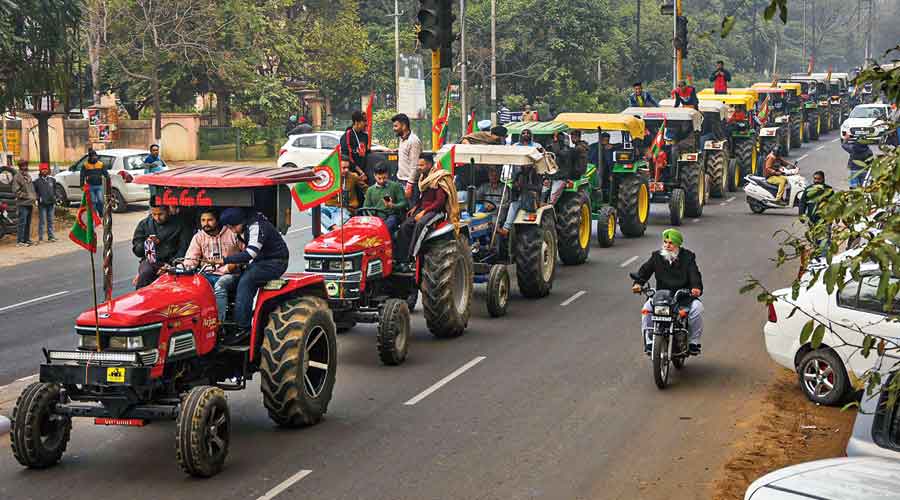Agriculture minister Narendra Singh Tomar on Friday blamed an “external force” for preventing an early resolution of the standoff with the farmers, speaking after the farm unions rejected the government’s offer to keep the three contentious laws in abeyance for 18 months instead of repealing them.
Briefing reporters after a meeting with farmers that ran into several hours but saw very little conversation, Tomar said some external force was trying to ensure the agitation continued, once again bringing up a conspiracy theory that the government’s supporters have repeatedly invoked since the protesting farmers began gathering near Delhi’s borders from end-November.
He sidestepped the question whether he saw a division among the farmers since some were in favour of accepting the government’s latest offer. “We should remain hopeful. Let’s wait till tomorrow for the unions’ final decision,” he added.
Ministers have told the union leaders to reconsider and convey their response by noon on Saturday, after which a date for another meeting can be fixed. This is the first time in 11 such meetings that the negotiations have ended without a date being set for the next meeting.
At Friday’s talks, the government’s main interlocutors — Tomar and food minister Piyush Goyal — expressed displeasure at the Samyukta Kisan Morcha announcing to the media its rejection of the Centre’s proposal on Thursday before communicating it to the ministers.
The government also said that the 18-month abeyance was the maximum it could offer, but the farmers stuck to their demand for repeal of the three laws.
Yogendra Yadav of the Jai Kisan Andolan said the dialogue had broken down and the farmers were now preparing for the “kisan parade”, which is to feature a tractor rally in Delhi on Republic Day.
While the other union leaders stopped short of saying the talks had broken down, they were indeed focused on preparing for the parade.
Some of them met the Delhi police commissioner in the evening to chalk out the route. According to Darshan Pal of the Krantikari Kisan Union, a route map the police have suggested will be discussed with other union leaders on Saturday.
Explaining why the farmers had refused the latest offer, Yadav said the question was what would happen after the 18 months were over. He also cited how the farmers had time and again rejected the idea of referring the dispute to a committee.
“Once we lift this protest, it will not be easy to build such a movement again. And then the government can, after 18 months, implement these very laws saying the committee had said all was well with the laws,” Yadav said.
The All India Kisan Sabha (AIKS) questioned the legal basis for the proposal, underlining that the Constitution had no provision for keeping a law in abeyance after the date of implementation had been notified and the rules framed.
Former Lok sabha secretary-general P.D.T. Achary endorsed this view to The Telegraph. Bureaucrat turned politician Yashwant Sinha too tweeted: “Govt does not have the power to keep a law passed by Parliament in abeyance specially when its rules have been notified. Such a law can only be repealed.”
However, a union leader said the impression the ministers had given while making the offer on Wednesday was that the government would either furnish an affidavit in court on the 18-month freeze or appeal to the court to extend its stay on the laws’ implementation.AIKS president Ashok Dhawale and general secretary Hannan Mollah asked why, if the government could agree to keep the laws in abeyance for 18 months, it could not agree to repealing them and enacting new laws to protect farmers’ interests.
Now that the government has managed to create a slight difference of opinion among the unions with its offer, the farmer leaders feel, the ministers have hardened their stance hoping to drive a further wedge into the movement.
Of the 32 Punjab unions, 15 were in favour of considering the offer but with different caveats, with some favouring a longer period of suspension. Most were, however, agreed that the offer could be accepted only if an ordinance was issued guaranteeing a minimum support price for 23 crops.
Given the enthusiasm across Punjab for the farmers’ Republic Day parade, union leaders feel they can paper over these differences for now, especially since the groundswell of support for the movement would make it difficult for any leader to break away.
Even the dissenters say they are ready to go along with the majority view, which favours rejecting the government’s offer.











